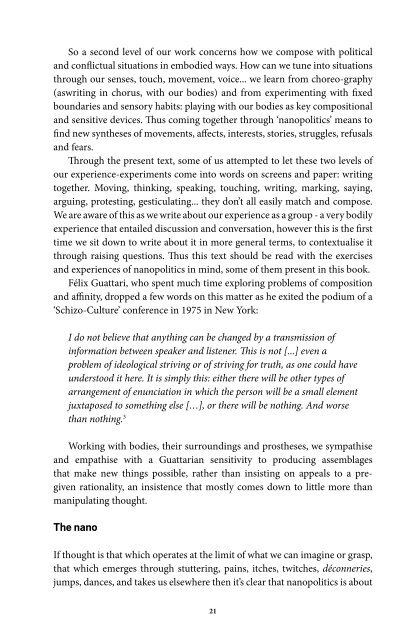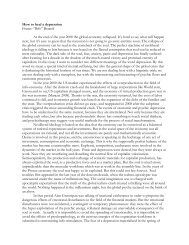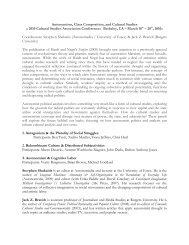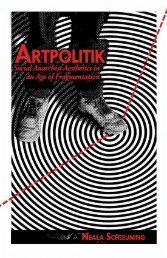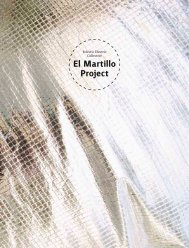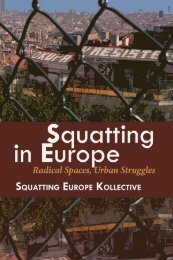- Page 3 and 4: nanopoliticshandbookthe nanopolitic
- Page 5 and 6: IndexpageIntroduction11collective p
- Page 7: Towards a careful listeningexercise
- Page 10 and 11: 1/2/3/A map of this bookThis book h
- Page 12 and 13: From bodies to booksTrying to rende
- Page 15: collectiveprocesses
- Page 20 and 21: thinking. Thinking not by virtue of
- Page 22 and 23: As such, we are not concerned with
- Page 24 and 25: anymore; then you join the groups o
- Page 26 and 27: How are our bodies interpellated, i
- Page 28: untouchable to the ‘public’, an
- Page 31 and 32: thing which might just help us with
- Page 33 and 34: to zero. It could be Guattari or an
- Page 35 and 36: over sticks, stones, shoes. Nanopol
- Page 37 and 38: To produce or not toproduce…is th
- Page 39 and 40: Some of us had arrived to Barcelona
- Page 42 and 43: The violence of cutbacks in public
- Page 44 and 45: this way we began to produce though
- Page 46 and 47: neighbourhoods and collectives, rel
- Page 48 and 49: traversed by a preference for a ‘
- Page 50 and 51: While a group-that-presents or a gr
- Page 52 and 53: craftsmen of the trade of componend
- Page 54 and 55: 7. Donna Haraway (1999) ‘The prom
- Page 56 and 57: also about making knowledges about
- Page 58 and 59: allowed to learn from it? 5 A manag
- Page 60 and 61: life-turned-into-population, via th
- Page 62 and 63: about freeing us from an oppressive
- Page 64 and 65: exerciseMeetingIn our understanding
- Page 66 and 67: To prepare is to touch upon these d
- Page 68 and 69:
2. The second one is the step-aside
- Page 71:
Technoshamanism— Fabiane Borges a
- Page 75:
the machine’s magic. We do not ye
- Page 79 and 80:
exerciseTechnoshamanistperformance
- Page 81 and 82:
part iii: offering and ritual8. act
- Page 83 and 84:
photonovelIt is the search for a fi
- Page 85 and 86:
A rehearsal of change:Theatre of th
- Page 87 and 88:
step those looking at the image cou
- Page 89 and 90:
importantly however, these exercise
- Page 91:
time the whole group ends together.
- Page 94 and 95:
Boal’s writings were translated a
- Page 96 and 97:
ideologies: one linked with pleasur
- Page 98 and 99:
We could have more descriptions of
- Page 100 and 101:
The skills required to play Soma ga
- Page 102 and 103:
exerciseTesting limits,playing with
- Page 105 and 106:
Street Training:experiences of co-c
- Page 108 and 109:
The distinction between the persona
- Page 110 and 111:
I valued the detailed, insightful r
- Page 112 and 113:
LondonJoyFind a phone box and squee
- Page 114 and 115:
Carve the initials of the person yo
- Page 116 and 117:
Ignore the TV news because otherwis
- Page 118 and 119:
enable a dynamic and transformative
- Page 120 and 121:
on small nuclei of armed struggle;
- Page 122 and 123:
and head? (As your attention travel
- Page 124:
To understand the particular use of
- Page 127 and 128:
Finally come to stillness to acknow
- Page 129 and 130:
ities via tonic variations: an impe
- Page 131 and 132:
In this sense, mind is the opening
- Page 133 and 134:
it is not in itself a contemplation
- Page 135 and 136:
ing into play the fundamental relat
- Page 137 and 138:
Endnotes1. For the history of somat
- Page 139:
36. Bonnie Bainbridge Cohen, “The
- Page 143 and 144:
Notes and Reflections fromsome nano
- Page 145 and 146:
others and ourselves. A sense of en
- Page 147 and 148:
oys behave today’. Rather we want
- Page 149 and 150:
have been cultivating a mask of dia
- Page 151 and 152:
learning about power, learning whil
- Page 153 and 154:
central to the workshop. As we expl
- Page 155 and 156:
Merav comes from Berlin to facilita
- Page 157 and 158:
tity, with the aim not just to flex
- Page 159 and 160:
in a way it is not really me feelin
- Page 161 and 162:
and a desubjectivation that is a be
- Page 163 and 164:
The body of a teacher— a nanobody
- Page 165 and 166:
I trust your valuesI trust your int
- Page 167 and 168:
...lies in order to control. Toughe
- Page 169 and 170:
and experiences for acquiring, enha
- Page 171 and 172:
spectful and not very funny, classr
- Page 173 and 174:
exerciseColumbian hypnosisfor group
- Page 175 and 176:
Brain Wide Shout— Mara FerreriThe
- Page 177 and 178:
Visualising, feeling this contact.
- Page 179:
theorizations
- Page 182 and 183:
e concerning myself with the ‘fem
- Page 184 and 185:
lackmailing, guilt-driven and thus
- Page 186 and 187:
space and subjectivity: we have too
- Page 188 and 189:
mean you know how a village gets to
- Page 190 and 191:
each other even though (and precise
- Page 192 and 193:
make this possible, the alternative
- Page 194 and 195:
exerciseMapping your care network -
- Page 197 and 198:
The bodies of proletarianreproducti
- Page 199 and 200:
(how and what we analyse, organise,
- Page 201 and 202:
what Foucault talks about as both i
- Page 203 and 204:
So we mustn’t take such minimal p
- Page 206 and 207:
Stiegler distinguishes proletariani
- Page 208 and 209:
onds? Can it not bind and loosen al
- Page 210 and 211:
question of ‘composition’ betwe
- Page 212 and 213:
to live within rather than against
- Page 214 and 215:
very minor, communist movements. Th
- Page 216 and 217:
their goals. It was the combination
- Page 218 and 219:
And Robert Brenner (2009), ‘What
- Page 220 and 221:
engage with or (re)create? Write do
- Page 222 and 223:
ecause of?) this temporal disjunctu
- Page 224 and 225:
Too vitalist? The very ontology of
- Page 226 and 227:
Can we, through the affective pract
- Page 228 and 229:
oneself in the creation of such con
- Page 230 and 231:
nanopolitics had brought together a
- Page 232 and 233:
exerciseA practice of walkingDevelo
- Page 234 and 235:
means of expression; indeed, ‘aff
- Page 236 and 237:
defines an utterance as a bringing
- Page 238 and 239:
phenomena have come to represent wi
- Page 240 and 241:
Recording 8. PitchIV. VolumeAs alre
- Page 242 and 243:
The timbres, intonations, paces and
- Page 244 and 245:
An evocation for attentive listenin
- Page 246 and 247:
exerciseListening and speaking warm
- Page 249 and 250:
Notes on how to grow tomatoesfrom a
- Page 251:
At some point the plant will ceaseg
- Page 256 and 257:
The procedure is simple: its point
- Page 258 and 259:
At least for an initial period, it
- Page 260 and 261:
ingredient variations:play around,
- Page 263:
additionalmaterials
- Page 266 and 267:
Activism and the life of groupsTher
- Page 268 and 269:
Isabelle Stengers, ‘Reclaiming An
- Page 270 and 271:
La sociedad terapeutica. Revista Es
- Page 272 and 273:
Georges Canguilhem (1991) (French e
- Page 274 and 275:
The Commoner has many articles on t
- Page 276 and 277:
collective practice of study school
- Page 278 and 279:
that’s somewhat inspired by the T
- Page 281 and 282:
Image indexFront /Back cover17, 182


